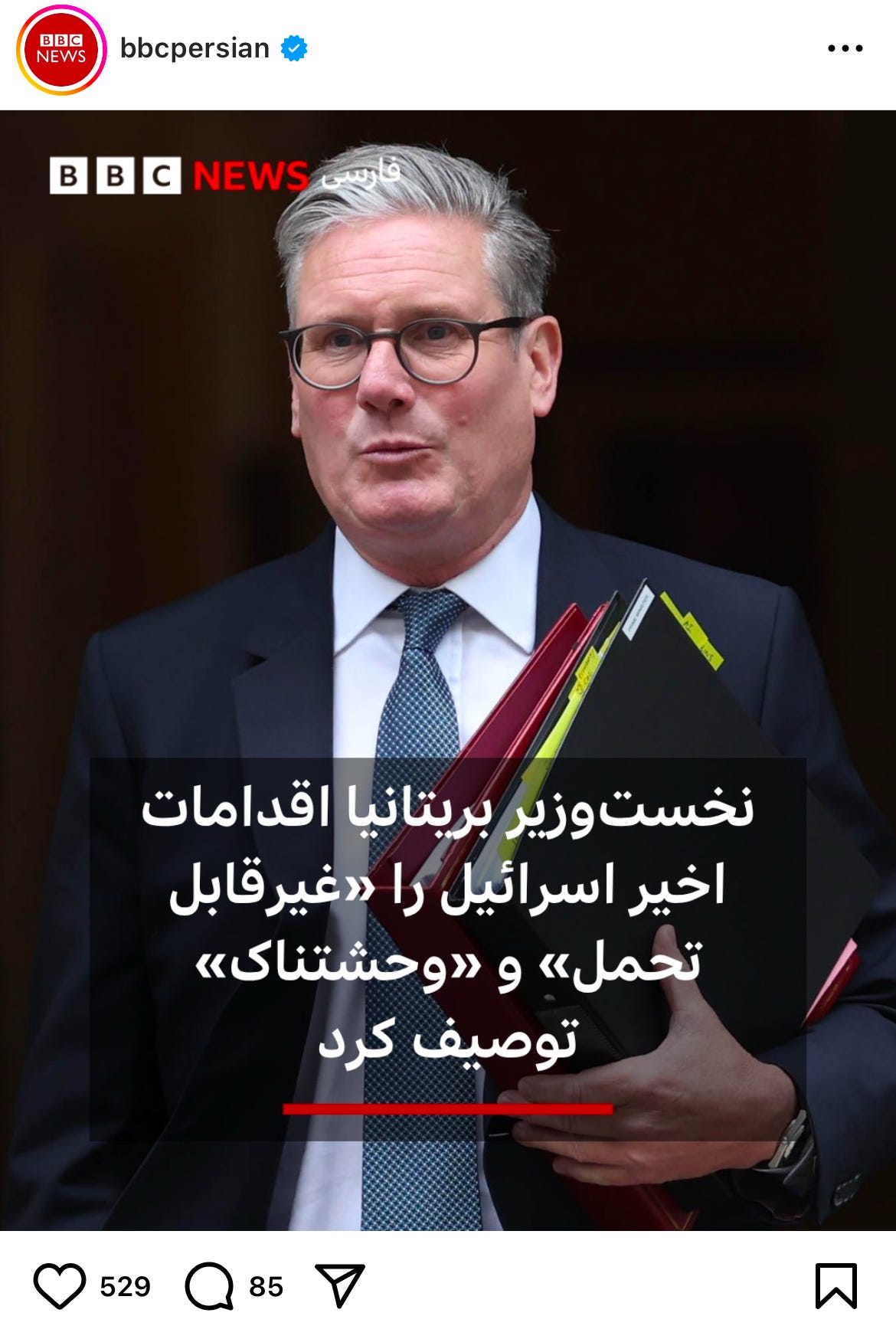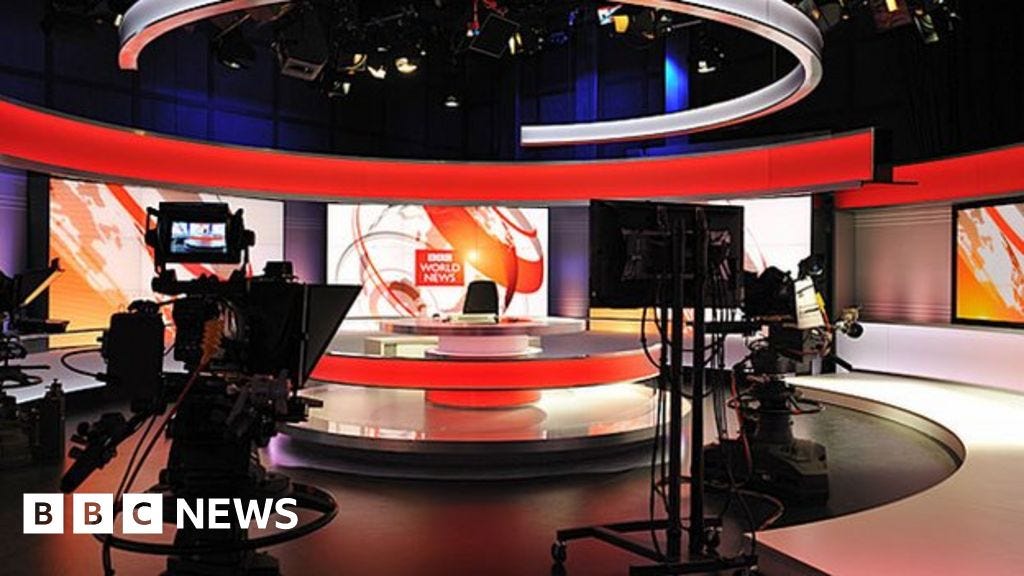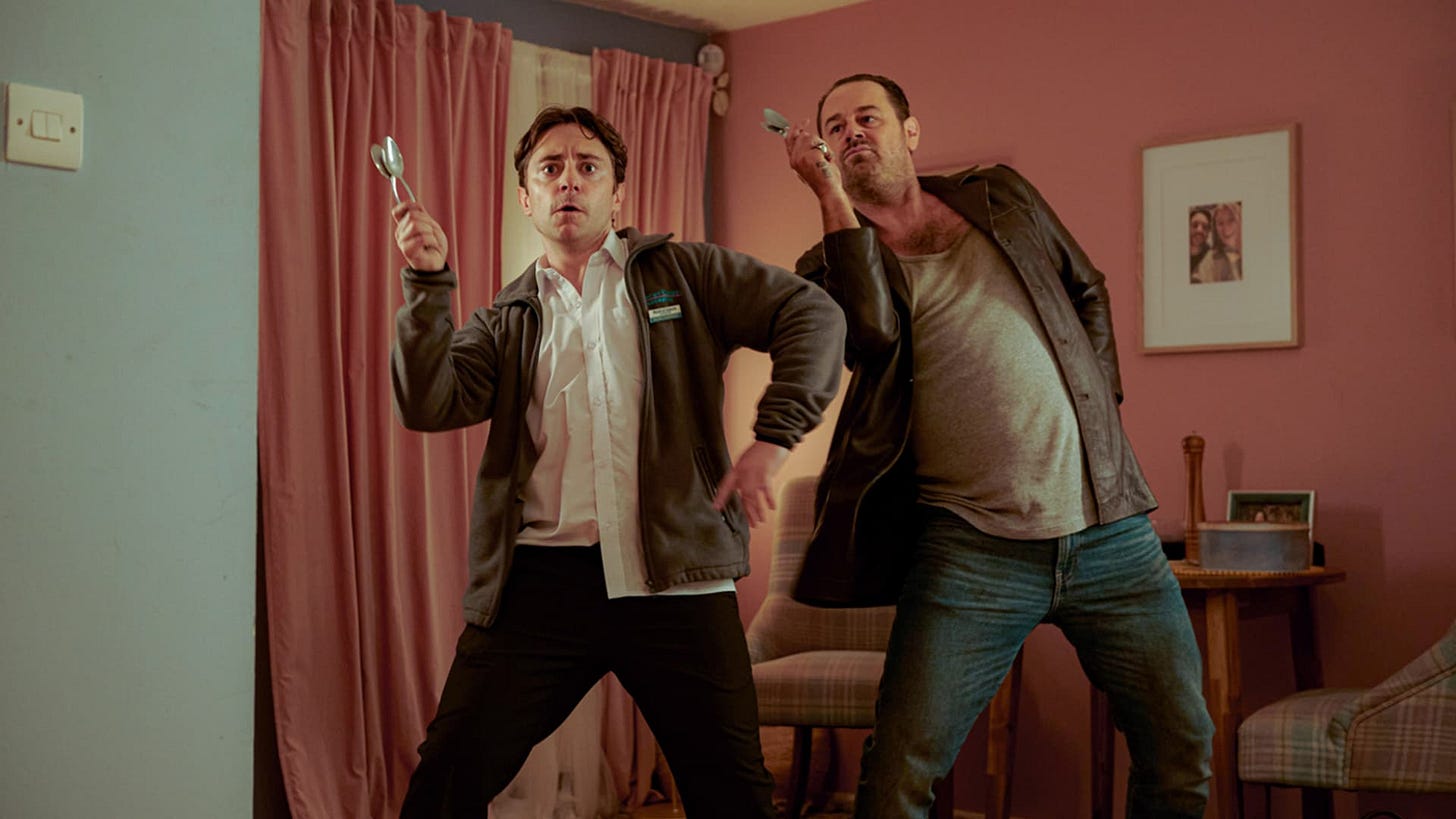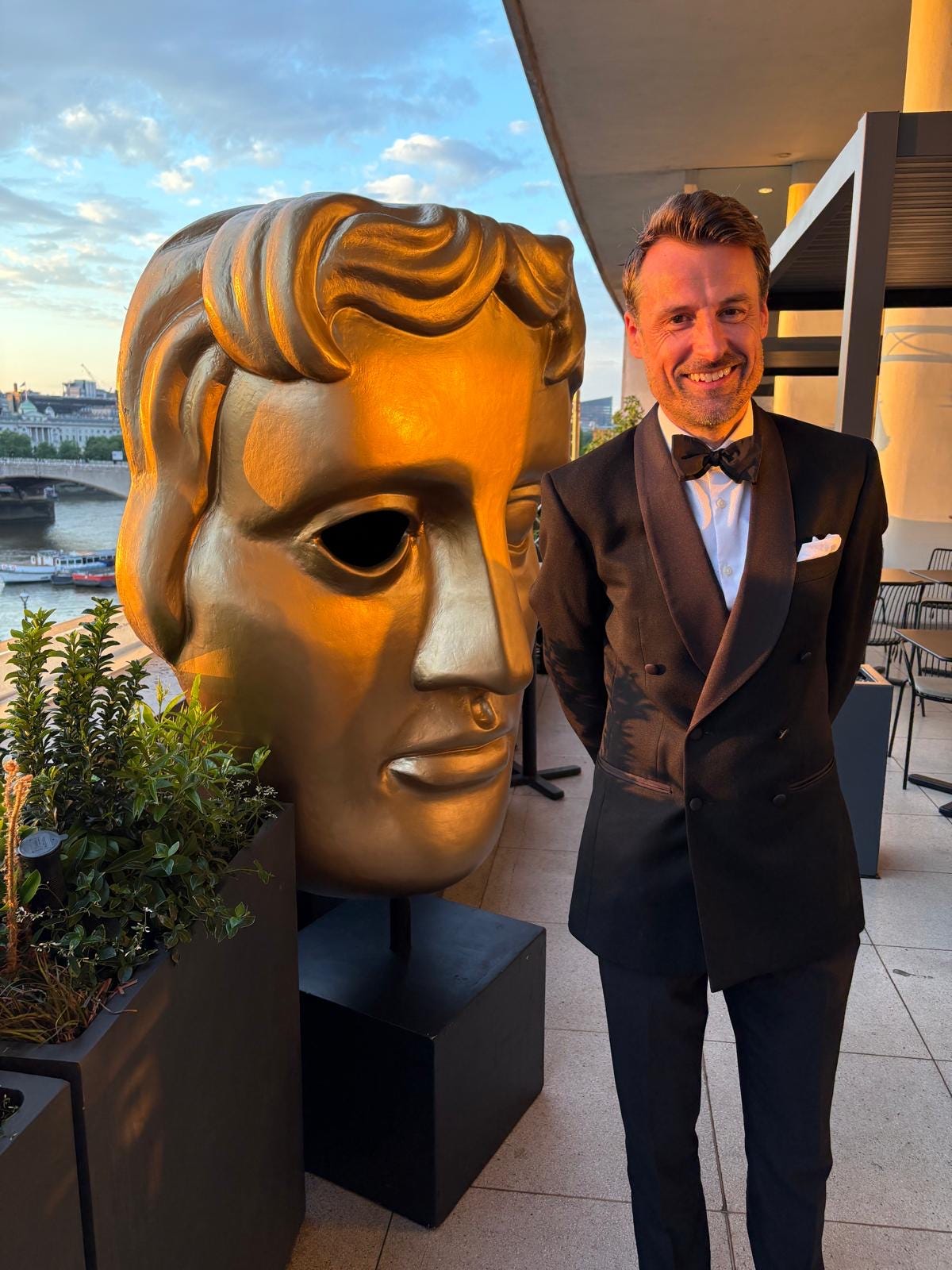Exclusive: BBC World Service faces 'managed decline' amid 'perfect storm' of challenges
ScreenPower: where TV and Film meet politics and power
Hello and welcome to ScreenPower.
🌍 Today’s newsletter is a soft power special - with a focus on the BBC World Service, ahead of a crucial week for the broadcaster.📡
In this edition:
💥 The BBC World Service is facing a ‘perfect storm’ of challenges ahead of next week’s Spending Review - that’s according to a new report our today from CreativePower and UCL.
💥 The report reveals that the World Service makes an ‘outstanding’ contribution to British soft power abroad - in the first study ever to take a structured approach to measuring its soft power impact.
💥 But the Government faces a choice: to fund sustained growth of this soft power asset, or accept a future of managed decline.
💥 This comes as Foreign Office officials privately warn the UK needs a ‘harder edged approach’ to soft power - in documents I obtained under FOI.
➕
👊 Plus the BBC News Channel has come in for sharp criticism from senior figures just two years after the UK and international versions were merged. “The BBC is making a mistake”, one told us.
Here goes… 📡🌍💪💥
🌍 Soft Power: It’s time for a shift in thinking
Britain has some of the world’s best soft power assets - especially in the media and creative industries. And at times, we do a decent job of promoting them abroad (e.g. the ‘GREAT’ campaign).
But at home, we’ve become complacent. We see the UK sitting near the top of the global soft power rankings, but rarely ask what’s behind those stats.
That complacency leads to neglect. Some of our strongest soft power assets - like home-grown drama, children’s TV, and public service broadcasting - are being steadily weakened. The outputs remain solid, but the structures are fraying.
It’s not enough to talk about soft power abroad - we need to develop, maintain and strengthen the sectors that generate it at home.
And we need to treat soft power as what it is: a strategic asset in an increasingly competitive space.
This week, politics has been focused on drones, tanks and submarines. But in a world defined by values and narratives as much as hard power, we should also be talking about media, culture, creativity - and the global influence that flows from them. There’s a reason Russia and China are spending billions building global media influence.
And the UK knows it’s falling behind. A Freedom of Information Request (FOI) I submitted to the Foreign, Commonwealth and Development Office (FCDO) has revealed internal warnings that Britain is “at high risk of losing influence” in the Global South without “harder-edged approaches” to soft power. That’s not me editorialising - it’s Whitehall’s own assessment.
So what do we do?
We - the UK’s creative industries - need to get much better at articulating our soft power value. We need clearer, more credible evidence of how our sectors serve the national interest. And we need to tell that story in a way that can’t be ignored.
🚀 That’s why I’ve launched CreativePower - a new soft power research body, helping organisations across media, culture, sport and education to understand, measure and communicate their soft power impact.
Our first report, published today with University College London’s Institute for Global Prosperity, is the first structured attempt to measure the soft power value of one such institution: the BBC World Service. You can read all about it in the next story.
If you or your organisation want to tell a more global story about your British success, CreativePower can help. Just hit reply to drop me a line.
⚠️ BBC World Service facing a ‘perfect storm’ of challenges ahead of Spending Review
Imagine if the UK had a global media platform that could reach into places other outlets can’t.
One that speaks to audiences in 40+ languages, tackles disinformation, builds trust, and contributes to British soft power.
Well, we already have it. And we’re letting it slip.
This week I’ve published the first ever soft power impact report on the BBC World Service - a collaboration between CreativePower and UCL’s Institute for Global Prosperity.
We commissioned new polling, held international focus groups, and interviewed a range of experts including former MI6 Chief Sir John Sawers, ex-DCMS Perm Sec Dame Sue Owen and former Foreign Secretary and Chancellor (Lord) Philip Hammond - and with a foreword from politico and podcaster Rory Stewart.
And we’ve built a scoring framework - The Soft Power Impact Index - to rate the contribution individual institutions and sectors make to soft power.
Why is this important now? Because next week’s Spending Review from the Chancellor could be a big moment for the World Service.
Break it down: Currently around two thirds of its funding comes from the Licence Fee, and the rest from Government. But there are rumours the Government portion could be reduced, raising the prospect of further cuts.
Refresh: Most people have an idea of the World Service as a slightly old school radio station. But it’s much more than that.
For a start, there isn’t just one World Service - there are 42! That’s 42 different languages reaching 320 million each week in over 100 countries.
And the World Service has some incredible reach on social media - e.g. BBC Persian’s Instagram page has more followers than CNN, and BBC Hindi’s YouTube page has more subscribers than the english language version. There are also dedicated TV channels in Persian and Arabic.

So what does the report tell us?
🌍 The BBC World Service makes an ‘outstanding’ contribution to the UK’s global soft power, having built an unrivalled global reach and trusted presence over nearly a century. Our report gave it a Soft Power Impact Index ranking of 86%. 🥇
🎯 It’s a strategic national asset, contributing indirectly to UK foreign policy and security objectives, while maintaining its independence from political pressure.
🇬🇧 Its activities align closely with British values - and is strongly associated with positive perceptions of the UK.
📡 It plays a major role in tackling disinformation, a growing threat to global stability.
However….
⚠️ The World Service is now operating in a far more competitive global environment than when it launched nearly a century ago, and is being outspent by rivals like China and Russia, who are quick to move in where the BBC cedes ground.
📉 It’s already paying the price of funding instability, with diminished global reach due to recent cuts. But there remains strong demand for information - and gaps have been left by the closure of the Voice of America.
💡 It remains strategically undervalued - often seen as a communications tool, rather than a long-term strategic national asset.
⏳ It’s at a crossroads. A perfect storm of competition, demand and decline leaves two options: ambitious growth or managed decline.
Late last year BBC Director General Tim Davie gave a speech warning that “when the World Service retreats, state-funded media operators move in to take advantage”. He pointed to two examples where gaps left by the BBC have been utilised by rivals:
“Kenya’s state broadcaster KBC, under tough financial constraints, has taken up Chinese output on TV and radio…Meanwhile in Lebanon, Russian-backed media is now transmitting on the radio frequency previously occupied by BBC Arabic.”
Following this, we conducted focus groups in Kenya and in Lebanon and found that, while the World Service has a long history in both countries, its trusted reach cannot be taken for granted. The full findings are an interesting read.
🛠️ So what needs to happen next?
We’ve made several recommendations. You can read them all in the report, but here are the headlines:
🏦 Funding
Tim Davie said last month that he wanted to double the reach of the BBC World Service. So how much would that cost?
I’ve analysed the annual budget of the World Service (currently £366m - but it varies) against its global audience reach for the past decade. You can see the results below. It’s bumpy, but the lines broadly follow each other, albeit with some delay. This suggests that doubling audience reach would cost somewhere in region of £200m-£400m per year.
While we haven’t gone as far as to recommend doubling the budget, we have concluded that it’s hard to see the logic in forcing Licence Fee payers to fund an international service and national strategic asset.
So, we’ve said the World Service should receive long-term, stable funding, primarily from Government, sufficient to support sustained growth. Stability is almost as important as the quantum of funding, as it allows the BBC to plan into the long term. We’ve recommended that the Government keep an open mind about using the defence budget, further aid money, and philanthropy in the mix.
📈 Strategy for Growth
It’s one thing saying you want money to expand your audience - but you also need a plan to get there. So we’ve recommended the BBC work with the Foreign Office to develop a Strategy for Growth, targeting new markets where it can build trusted reach in a way that also relates to the national interest. E.g. Former UK National Security Advisor Lord Sedwill suggested to us that the BBC could expand in South America, not currently an area of significant influence for either the World Service, or for the UK.
The study also suggests an opportunity for expansion beyond the Global South - for example in the United States. Our polling in the US (conducted by JL Partners) shows a direct, positive relationship between familiarity with the BBC, trust in the World Service, and perception of the UK. It also (somewhat surprisingly) reveals a stronger awareness of the brand among 18-29 year olds than any other age group - although (less surprisingly) it can be divisive, and Republicans are three times more likely to distrust the BBC World Service than Democrats.
🖥️ Platforms
We’ve recommended the World Service pursue ambitious digital growth, building on its existing strengths on YouTube, Instagram and TikTok.
But we’ve also recommended the BBC take its international TV news offering much more seriously. In our interviews and research, we were struck by the strength of feeling around the BBC’s TV News Channel. Read p.18 of the report for some pretty strong criticism by former DCMS boss Dame Sue Owen, former Culture Minister Lord Vaizey, and ex-National Security advisor Lord Sedwill.
“The BBC doesn’t really know what its international television news strategy is” - (Lord) Ed Vaizey
The relationship between the World Service and the News Channel is complicated (we get into this in the report), but as one of the most visible representations of the BBC globally, we argue that it shouldn’t be left behind in a the race to digital.
So, we’ve suggested the BBC develop a more coherent Television strategy for international news.
‘Extremely good value for money’
There’s no doubt that if the UK started to design a tool for global influence from scratch, it would cost many times more than what the World Service costs today. As former Chancellor Philip Hammond told us, the World Service is “extremely good value for money”.
Not alone: And we’re not the only ones talking about this. The House of Commons Culture, Media and Sport Select Committee yesterday wrote to the Defence, Foreign and Culture Secretaries to make the case for the World Service. They too found that it serves an important strategic role for the UK.
To govern is to choose: Our report shows that the Government faces a choice - to either fund the World Service properly so that it can continue to build influence abroad, or allow it to become a second tier media asset on a downward trajectory.
We all know money is tight - but at a time of rising competition and growing instability, can the UK afford not to support this soft power asset?
“If the BBC World Service doesn’t get the funding it needs, it will do what hierarchical organisations tend to do – it will try to keep doing everything, but end up doing it all less well. You’ll get a gradual loss of capability, rather than making the tough choices needed to stay world class.” - (Lord) Mark Sedwill, former National Security Advisor, Head of the Home Civil Service, and Ambassador to Afghanistan.
The full report is live here → Global Reach, National Impact
💥 It’s the first of its kind, but it won’t be the last…
If your organisation wants to better understand or explain its soft power impact, CreativePower can help. Just reply to this email.
📺 What to watch…Mr Bigstuff on Sky
Mr Bigstuff would never have come onto my radar had I not been lucky enough to attend the TV BAFTAs last month to see Danny Dyer win ‘Best Male Performance in a Comedy Programme’ for his performance in the show, now in its second series.
It was created by and stars Ryan Sampson (Brassic), and was made by Sky Studios and UK indie Water & Power Productions.
I enjoyed this much more than I thought I would! It’s gloriously silly at times, sometimes dark, sometimes touching. The episodes are also a very digestible 30 minutes - so good for binging, or as a post-drama chaser. Give it a go.
Also thank you to Sky for hosting me at the BAFTAs 🎭 🙏
🎞️ Recommend ScreenPower
That’s all for this week. Thank you for reading ScreenPower!
As ever, do get in touch with any comments or questions on the topics covered in this issue, either by replying to this email or by connecting on LinkedIn.
And if you know someone who might enjoy this - why not forward it to them? It’s free!











